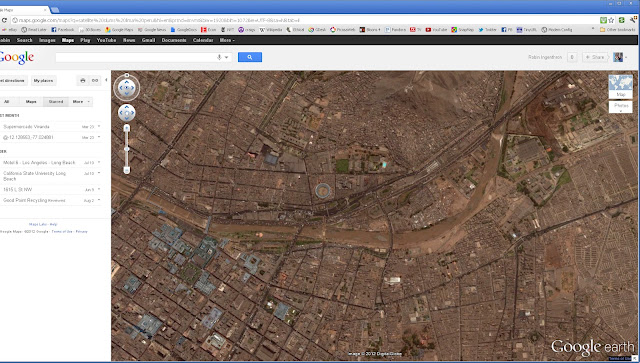 |
Fences around slums, to keep out the rich?
Last weekend, "Useless Lists of Jobs", was about pixelized slums, a bookend to the "Rich City, Poor City" UN Pixelizes World blog from last January. Each describes just how much wealth is in cities inside "poor" countries. Following our Fair Trade Recycling trips to Africa and South America, I'm thinking about specific encounters with relative poverty and relative wealth.
 |
| View of neighborhood from the sky... less colorful.. No yards, pools or streets. |
Environmental Justice via Ban on Trade? Environmentalists have made a very strong case that exports of computers for recycling should be taken "off the table", made illegal, either through an amendment to the Basel Convention. Recycling jobs, they argue, are so intensely hazardous that even export for repair (clearly asset, not waste management) should be illegal. If the factory that made your monitor replaces a bulging capacitor, they say, it's a slippery slope to recycling harm... So they would have us build a wall around the slums, to keep rich peoples' used equipment out.

These restrictions may keep rich people from Europe and America out. But cities like Lima, Rio, Kuala Lumpur, Shanghai and Guangzhou are also places of tremendous wealth. Outside the OECD, and in Lima itself, people are on high speed internet, replacing CRTs and LCDs with bigger and better gear.
The Interpol enforcement, European anti-export laws, USA bill HR2284, mandatory E-Steward certification... my fellow environmentalists think of these laws as a modest safeguard to keep the rich and poor apart. Some people want to keep scrap recycling jobs safely inside rich neighborhoods. Sorting non-ferrous metals and plastics, removing screws, is too short a short step from the "witches brew" of toxics lurking inside our PCs. Since hand disassembly wages are too low for Americans and Europeans, the solution is a whirring series of hammermills, magnets, crushers and sorters to "properly recycle" a computer with a bad capacitor.
The leaders of this campaign have use shady references to "international law" and "hazardous waste" to trigger import enforcements in these rapidly emerging markets. "Competent authorities" (like Egypt authorities in 2009) act on the concern over the
jus·tice (jIn many respects I agree. The wealthy person with a laptop to discard holds the "cards" (sound card, video card, etc.) But if you are poor, and have nothing, the absence of trade is not a solution. And if NGOs are saying that the emerging rich within the megacities like Shanghai, Shenzhen, or Mumbai are going to cut the slums a better deal than I will from Vermont, they are mistaken.s
t
s)
n.
1. The quality of being just; fairness.2.
a. The principle of moral rightness; equity.b. Conformity to moral rightness in action or attitude; righteousness.3.
a. The upholding of what is just, especially fair treatment and due reward in accordance with honor, standards, or law.b. Law The administration and procedure of law.4. Conformity to truth, fact, or sound reason: The overcharged customer was angry, and with justice.5. Abbr. J. Law
a. A judge.b. A justice of the peace.
Telling people in the slums who they can buy from, whom they can marry, what jobs they can do for a living, etc. makes environmental officials one more authority figure in the life of a human being who has a crushing number of authority figures around them. "You cannot recycle" may make sense if you are comfortable that prostitution, drugs, kidnapping, robbery, conflict mining, child soldiering and abusive regulatory enforcer jobs (ironically lower on my list than scrap recycling) are being governed well, and it's time to move up the chain to take another job - laptop repair - off the table.
Let them choose which of us to buy from. Freedom is empowerment, and we need to admit that free trade is a form of freedom. The negative results of free trade, and there are many, are not healed by boycotts, prohibitions, or bans.
 |
| Back away slowly |
The opposite of "justice", my English teacher C. Perry Thomas said, is "mercy". The sweetest mercy is freedom. This debate about 'e-waste' is a debate about whether to trust a geek to buy what he wants and knows how to fix, and to trust him/her to recycle in a safe way if you give them the economic incentives to do so.
which bring brings me, belatedly, back to the topic of apology...
A sincere apology is should mean something to the person apologized to. An apology to someone who isn't going to accept it can't really be played to the crowd and still be sincere. I do have an apology to make, however. I need to write it up better, but will be apologizing for the term "Ayatollah of E-Waste", something I didn't coin but have promoted in this blog. I'll post the apology next week from the ISRI Conference in Nevada.



No comments:
Post a Comment